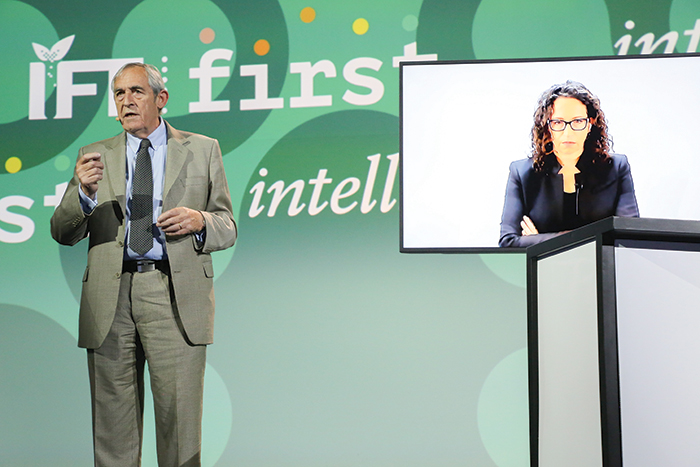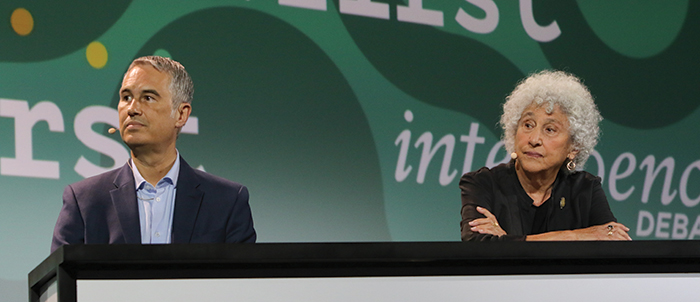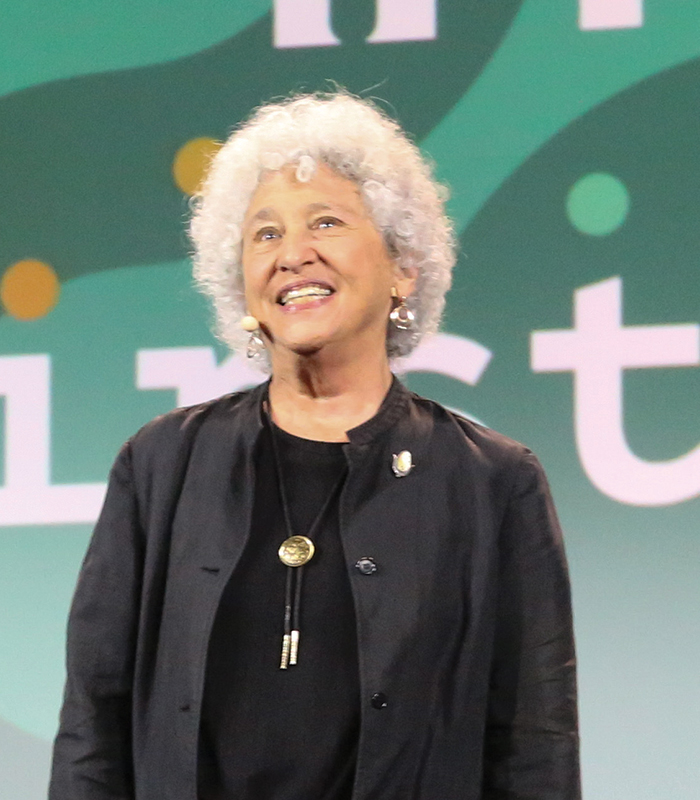
The Question: Should We Eat More Processed Foods?
An Oxford debate at this year’s IFT FIRST: Annual Event & Expo tackled the health impacts of processed foods, the legitimacy of NOVA food classification, even the language framing the debate itself.
Article Content
The moment Carlos Monteiro and his colleagues at the University of Sao Paulo debuted the NOVA classification system in 2009, it ignited a contentious debate with the food and nutritional science communities around the basic legitimacy of the classifications, their relevance as nutritional tools, and the role of food manufacturers in formulating and marketing what NOVA classifies as “ultra-processed” foods.
The discussion has penetrated all facets of commercial and academic food science, from research to consumer to regulation.
What is the proper definition of ultra-processed food? What’s its impact on health and nutrition? And ultimately, what role should it play in food product development? The keynote debate at the recent IFT FIRST: Annual Event & Expo assembled four leading voices to articulate arguments for and against, in an Oxford-style debate on the question: Should we eat more processed foods?
The discussion, co-hosted with IFT by Intelligence Squared, a nonprofit media company, attempted to avoid cliché references to basic processing versus junk food. “Nobody is here to defend chips and lollipops,” said moderator and journalist John Donvan. “Instead, the ultra-processed food that we’re going to be talking about is food made up of numerous ingredients combined by ever advancing technology so that it will taste good and look good and deliver nutrition, fit in a package, be convenient, and last a long time.
“And most importantly, it is intended to play a solid role in our overall diets. The debaters are here to make the case for and against having those foods in our diets and [with] a net social good or not. “
Following is an excerpt, edited for length and clarity.
Amy Webb, CEO, Future Today Institute: Words matter. Our brains crave structure, they crave order, so we default to labels. But labels obscure nuance and labels help to inflame cognitive biases. Today, we’re going to be talking about ultra-processed or highly processed foods, and we need to be really careful about those labels because words matter.
[NOVA] group four foods … are ultra-processed. When we talk about foods using these labels, our brains immediately make a value judgment. Group four is irresponsible and unforgivable. But if we zoom out and challenge our cherished beliefs, that’s why we’re having this debate after all, there are … compelling reasons to say yes.
I’ve got whole grain bread in my kitchen; it’s mostly seeds. I bought it in a store. Now, technically this is classified as ultra-processed, but it is full of great nutrients, it’s low in fat, it’s high in complex carbohydrates. This bread is contraband, according to this label. At the same grocery store where I bought the bread, there’s a bakery. And at that bakery, they make delicious brioche that is from scratch, that is minimally processed, and it’s nutritionally void.
Marion Nestle, Paulette Goddard Professor of Nutrition, Food Studies and Public Health, Emerita, New York University: Ultra-processed foods are the most important nutrition concept to come along since vitamins. And I say this because I talk about this from a public health standpoint. Obesity and overweight are the most important public health nutrition problems in America today. Obesity rates started to increase in 1980, and between 1980 and 2000, the number of calories in the food supply increased by nearly a thousand. It went from about 3,000 calories to 4,000 calories a day and people began eating more calories, and we need to look at why.
And part of the reason for that was that the corporations had to respond to the shareholder value movement, which was a movement that required corporations to make returns to stockholders their very first priority. So food companies began making new products that were irresistible, delicious, inexpensive to produce and extremely profitable. What’s important to understand about ultra-processed foods is that they are a very specific category of foods. So a major public health priority is to reduce intake of ultra-processed foods. Not eliminate them entirely but reduce them.
Michael Gibney, Emeritus Professor of Food and Health, University College, Dublin: They tell me that I shouldn’t eat low-fat spreads or margarines that are high in [unsaturated] fat and low in trans [fat] because they’re ultra-processed, they contain additives. Where I come from, these products have lowered blood cholesterol by 50% and made a very significant contribution to reducing cardiovascular disease.
The future will demand plant-based foods more and more. And a recent study looked at the proportion of ultra-processed foods in the diets of omnivores, flexivores, vegetarians, and vegans. And they found that as you moved upwards in the groups consuming most plant-based foods, ultra-processed foods went up. Very simply, just like you can’t make an omelet without cracking eggs, you can’t make plant-based foods without processing engineering and processing aids.
Kevin Hall, Senior Investigator, National Institute of Diabetes and Digestive and Kidney Diseases, National Institutes of Health: If this debate had been held five years ago, I probably would’ve been arguing for the other side. I’d spent my career at the National Institutes of Health (NIH) studying the effects of different nutrients on the human body. And then I heard about this new categorization of foods called the NOVA categorization system that basically said, “Nutrients? You guys are living in the dark ages. That’s not interesting. That’s not important anymore. It’s really about the purpose and extent of processing.”
I thought that was nonsense. It was anti-science. And so I asked the folks, “What is it that you think about these ultra-processed foods that’s causing obesity?” And they said, “Well, it’s the salt, the sugar, and the fat and the low amounts of fiber.” I said, “Aha, you just named a bunch of nutrients. You can’t have it both ways. The debate is over.” Well, scientists can’t be satisfied with just a win on a rhetorical debate. One of the things that we could actually do is design an experiment. With my colleagues at the NIH, we designed an experiment where we brought in 20 men and women to live with us at the NIH Clinical Center for a month. And we designed two diets that were matched for the salt, the sugar, the fat, the fiber, the carbs.
One [randomized] group started a very highly ultra-processed food diet that was matched for the salt, the sugar, the fat, and the fiber and another group ate a diet that had 0% ultra-processed food. Basically asked them to eat as much or as little as you want and after two weeks we swapped them. If it was about the nutrients, then there should be no difference in how many calories these people ate, and I would be right once again.
However, I was drastically wrong. When these people were eating the ultra-processed diet, despite being matched for these nutrients of concern, they ate 500 calories per day more. They gained weight and they gained body fat. Whereas when they were eating the other diet, the unprocessed diet, they were losing weight and losing body fat. Now we’re trying to figure out, what is the mechanism?
Donvan: Amy, I’m not hearing your opponents dispute the argument that ultra-processed food can be sort of juiced with nutrients to improve their health benefit, the nutrient benefit, the way that you mentioned you saw in the bread that you like. But they’re saying it’s the other stuff that happens during processing that builds their case for the dangers of ultra-processed foods. What’s your response to that?
Webb: We need to broaden our thinking here. I’m an endurance athlete. I am a long-distance cyclist, and I have to be very careful about what I put into my body. I have to stay hydrated. I can’t stop for a nutritious home-cooked meal on mile 50 during a long ride. I rely on ultra-processed foods to perform at my peak. And literally right now, the Tour de France is happening, the world’s most elite athletes are literally fueled by ultra-processed food.
Nestle: The amount of evidence that links consumption of ultra-processed as opposed to other kinds of processed foods to poor health outcomes is really pretty overwhelming by this time. We cannot ignore this literature.
Gibney: This idea that NOVA is the only classification of ultra-processed food is rubbish. Marion did say that you shouldn’t ignore the literature. Well, they’re ignoring it because there are three other categories: University of North Carolina’s category, the International Food Information Council’s category, and the European Prospective Investigation into Cancer category. One study took all of these and used a single database from Spain … and they asked the question, ‘What’s the impact of ultra-processed food on health?’ It was like snowflakes. NOVA showed an effect of ultra-processed food and obesity; none of the others did. University of North Carolina found an effect on blood pressure. None of the others did. And in every single metabolite they looked at, there was disagreement. Now, they can say they’re picking NOVA because it’s the most studied, it’s the most popular. That’s just not science.
Hall: There [are] all sorts of very positive aspects about ultra-processed foods. But what I think you can’t ignore is that there are some unintended consequences when we have 4,000 calories per day available in our food supply in the U.S.
Webb: There is a wealth of data and evidence supporting the fact that ultra-processed foods in the right circumstances and conditions are actually quite good for us. We have scientists that are looking into new ways to sustain us, and we are going to need optionality given what’s happening with geopolitics, climate change, and instability within our global supply chains. To me, it’s very clear that the world benefits from having more ultra-processed foods when we think about them in the right ways.
Nestle: The food industry benefits from ultra-processed foods because they’re among the most profitable foods on the market. What we have from Kevin Hall’s experiment is evidence that these foods encourage people to eat more than they should.
Gibney: I think the opposition [is] being a little disingenuous with the facts. In Kevin’s study, the people were offered foods with exactly the same calories, but they had to pick from the array of food in front of them because it’s what’s called ad-lib feeding. Well, the ones on the ultra-processed food by chance picked energy dense foods, so they had a much higher energy density than the control group.
Hall: Michael, I think that rationalizing and explaining the effects is one thing and then the observations are another. We’re left with a concept that ultra-processed foods, as a category, a very broad category—too broad, in my opinion—have some deleterious health consequences when you define them by the NOVA categorization system. There’s no doubt about that. Now we have to figure out what the mechanisms are. We actually have to do the science to try to figure out what it is about these foods that’s bad and use that science to help reformulate products in order to make them better for us.
Donvan: Amy, Marion’s a couple of times made the point that what troubles her about the current arrangement in the world of ultra-processed foods is that manufacture and distribution and advertising is controlled by multinational corporations whose interests are not the same as the people who are eating the food.
Webb: I concede that point in very limited circumstances. The truth is that it’s a big wide world out there. There are plenty of global food manufacturers. Some of them make products that are designed to continue to build market share.
And again, this is why I opened with an argument about words and labels. If we allow ourselves to be so reductive to point fingers at the typical agricultural companies or the typical industrial food manufacturers and demonize them without allowing ourselves more contours in the debate, we are doing actual irreparable harm to our futures.
Gibney: We are facing a future with challenges— challenges with increasing global population in the Western world, increasing aging population, challenges to the supply lines, food insecurity, and so forth. And if we’re going to tackle those as well as climate change, we are going to have to innovate.
Hall: The question is, should we, a nation that is already overconsuming most of our calories coming from ultra-processed foods, eat more? I mean, just logic suggests, given the situation that we find ourselves in, [the] answer is no. It does not mean we are demonizing ultra-processed foods in doing so, that’s just logic.
Webb: You just heard my opponent talk about logic. Well, what’s harder here is flexible thinking. Ultra-processed foods, it’s a huge category. Some of it’s bad, some of it is the result of evidence-based, research-backed food science and innovation and investment into emerging food technologies. Should we eat more ultra-processed food? When we think about things in a logical way, the obvious answer can be nothing other than yes.
Nestle: The 500-calorie difference that [Kevin Hall] found is extraordinary. Usually diet studies show a difference of 50 calories, if that many, and those are considered to be good. Cutting down on ultra-processed foods has a really good chance of helping us control what is an important public health problem, and I think we need to eat less of them. I realize that this is a challenge to the food industry, and I hope that it’s one you will take on really seriously.















